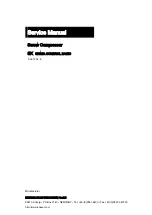
5. MAINTENANCE & TROUBLESHOOTING
Before carrying out any maintenance, switch compressor off, unplug it from the mains electricity supply, depressurise the
tank and allow unit to fully cool down.
5.1.
Keep the compressor clean and free of dust. Do not use cleaning agents. Wipe the compressor using a slightly dampened cloth and
blow it over with compressed air, if available.
5.2.
Ensure that the ventilation openings are clear.
DO NOT
allow any extraneous material to enter the unit via any of the ventilation
openings.
5.3.
To help prevent corrosion to the tank, drain it on a regular basis by opening the drain tap at the bottom of the tank, after draining
ensure the drain tap is fully closed.
5.4.
To examine the internal condition of the tank: unplug from the mains supply, release
pressure by means of the drain tap. Remove drain tap from tank and inspect by using an
borescope inserted through the drain tap boss.
5.5.
The troubleshooting guide below is intended to give an indication of the type of fault
which may develop with the compressor over a long period of service. The chart is
not intended as a guide on how to repair the fault, it is recommended that the
compressor is returned to an authorised service agent for rectification of serious faults.
5.6.
IMPORTANT WARNING
-
Air contaminants taken into the compressor will affect optimum performance.
Example: Body filler dust or paint overspray will clog the pump intake filter and may
cause internal damage to pump/motor components. Please note that any parts damaged
by any type of contamination will not be covered by warranty.
NOTE: It is our policy to continually improve products and as such we reserve the right to alter data, specifications and component parts without prior notice.
IMPORTANT:
no liability is accepted for incorrect use of this product.
WARRANTY:
Guarantee is 12 months from purchase date, proof of which will be required for any claim.
INFORMATION:
For a copy of our latest catalogue and promotions call us on 01284 757525 and leave your full name and address, including postcode.
01284 757500
01284 703534
sales@sealey.co.uk
Sole UK Distributor, Sealey Group,
Kempson Way, Suffolk Business Park
,
Bury St. Edmunds, Suffolk,
IP32 7AR
www.sealey.co.uk
Web
WARNING!
DO NOT
tamper with, or adjust, the pre-set pressure switch or safety valve.
4.5.2. Should there appear to be any loss of efficiency when using the compressor, ensure first that the air tool is clean and functioning
properly. If the air tool is satisfactory then refer to the trouble shooting guide.
4.6.
DO NOT
leave the compressor running for any length of time with the air tool attached, but not being used. If there is a pause in the
work, switch the compressor off. If the motor over-heats, the thermal cut-out will operate and cut the motor out. When the temperature
has returned to normal, the motor will re-start automatically.
4.7.
These compressors are designed with a 30% duty cycle. This means that the machines should not be used for more than 20 minutes
continuously, with a rest period of 40 minutes.
4.8.
If the operating note of the compressor changes, there may be a blockage within the tool, or the air hose may be pinched. The unit
should be switched off immediately, and the source of the blockage investigated and eliminated, before re-starting.
4.9.
When work is complete, switch the compressor off by pushing the red on/off switch inwards.
4.9.1. operate the air tool to clear any pressure left in the air hose.
4.9.2. Disconnect the air tool from the compressor.
4.9.3. open the drain tap at the bottom of the tank (figs.2 & 3) briefly to release any trapped moisture. This helps prevent corrosion on the
inside of the tank. Close drain tap.
4.10.
If it is intended to store the compressor away, allow it to cool before storing it carefully in a safe, dry, dust free, childproof location.
Environmental Protection.
Recycle unwanted materials instead of disposing of them as waste. All tools, accessories and packaging should be sorted,
taken to a recycle centre and disposed of in a manner which is compatible with the environment.
Fault
Possible Cause
Remedy
Air leakage from the valve of the pressure
switch (fig.4) whilst the compressor is off.
Pressure switch valve, due to wear or dirt
on the seal, does not perform correctly.
Unscrew the head of the valve, clean the valve seat
and the rubber disc (replace if worn).
Reassemble and tighten carefully.
The compressor does not stop and the safety
valve is tripped.
Reduction in performance. Frequent start-up.
low pressure values.
Irregular functioning of the compressor or
broken pressure switch.
Excessive air consumption, leaks from
the couplings and/or pipes.
Switch off compressor and contact
Authorised Service Agent.
Clean the air vents and ensure the work area is
ventilated. Do not over-run the compressor's duty
cycle.
Air tool requires higher spec. compressor.
Check / replace the seals of the fitting.
The compressor stops, then restarts
automatically after a few minutes.
Tripping of the thermal cutout due to
overheating of the motor.
Parts support is available for this product. To obtain a parts listing and/or diagram, please log on to www.sealey.co.uk,
email sales@sealey.co.uk or phone 01284 757500.
fig.4
WEEE Regulations.
Dispose of this product at the end of its working life in compliance with the EU Directive on Waste Electrical and Electronic
Equipment. When the product is no longer required, it must be disposed of in an environmentally protective way. Contact your
local solid waste authority for recycling information.
© Jack Sealey limited
Original Language Version
SAC03224,SAC03250,SAC03290 ISSUE:3 (SP) 11/11/13





















